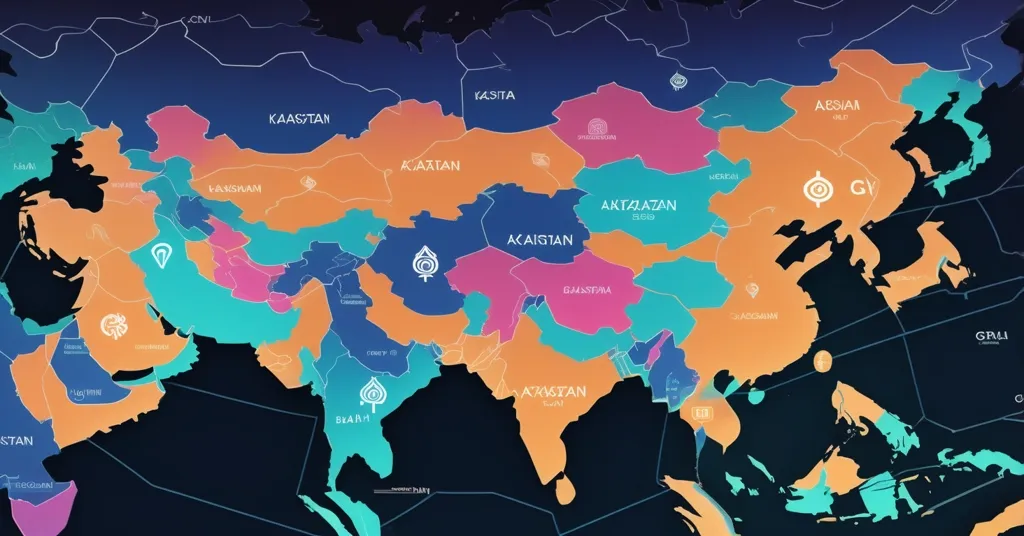Kazakhstan Aims for Digital Asset Hub Status, Thailand Launches G-Token for Retail Investors

Kazakhstan and Thailand Forge Ahead in Digital Asset Innovation
Kazakhstan aims to become Central Asia’s digital asset hub, lifting trading restrictions and implementing favorable policies, while Thailand plans to issue G-Token, tokenized government bonds aimed at retail investors.
- Kazakhstan targets Central Asia’s digital asset hub status.
- Thailand introduces G-Token for retail investors.
- Both initiatives reflect broader global trends in blockchain and digital assets.
Kazakhstan’s Digital Asset Strategy
Kazakhstan is ambitiously setting its sights on becoming Central Asia’s digital asset hub, a move that could significantly reshape the region’s economic landscape. The country is lifting trading restrictions on digital assets and rolling out favorable policies for digital miners and service providers. This initiative is part of a broader digital transformation strategy aimed at modernizing various sectors, including the energy sector. Digital miners are encouraged to utilize excess energy supply, with a proposed 70/30 energy-sharing model where foreign investors fund power grid upgrades. Since 2022, these miners have contributed over $7 million annually in taxes, showcasing the economic potential of this sector.
Consumer protection is a top priority in Kazakhstan’s digital asset strategy. The country is pursuing consumer protection laws and cracking down on unregistered digital asset platforms to ensure investors are safeguarded from scams and fraudulent schemes. Furthermore, Kazakhstan has initiated Web3 education programs and is exploring the idea of a national digital asset bank. The country is also working on a Central Bank Digital Currency (CBDC) to enhance financial inclusivity. Additionally, Kazakhstan aims to leverage Artificial Intelligence (AI) and the Internet of Things (IoT) to improve public services, adding another layer to its digital transformation efforts.
Can Kazakhstan truly transform into Central Asia’s crypto powerhouse? As a long-time advocate for decentralization, I find their approach to be a bold step towards reshaping the financial landscape of the region. However, while the potential for Kazakhstan to become a digital asset hub is exciting, challenges such as regulatory compliance and the environmental impact of increased energy consumption must be addressed head-on.
Thailand’s G-Token Initiative
Meanwhile, Thailand is advancing its financial landscape by planning to issue tokenized government bonds, known as G-Token. These bonds, part of the 2025 budget borrowing agenda, are aimed at retail investors to democratize investment opportunities. G-Token is expected to offer higher returns than traditional banking rates, potentially up to 4%, and will be traded on registered digital asset exchanges. The initiative received Cabinet approval, reflecting Thailand’s commitment to integrating blockchain technology into its financial system.
The market for tokenized government bonds is currently valued at $225 million and is experiencing rapid growth. Privately issued digital bonds have surged by 260% over the last year, reaching a valuation of over $4 billion. This growth indicates a broader trend towards tokenization in financial markets. Germany’s KfW has invested $11 million in digital bonds, signaling growing institutional interest in the sector.
Thailand’s G-Token could be the digital equivalent of a golden ticket for retail investors—without the chocolate factory. While this initiative is a step forward, one must wonder if it’s just another way for the government to dip its toes into the crypto pool without diving in headfirst. As a proponent of effective accelerationism, I appreciate Thailand’s effort to disrupt the status quo, but the role of government in what should be a decentralized financial ecosystem raises critical questions about control and freedom.
Global Trends and Counterpoints
Both countries are navigating the complexities of digital assets, aiming to harness blockchain technology for economic growth and financial inclusivity. Kazakhstan’s strategic position and Thailand’s focus on retail investors illustrate the diverse approaches nations are taking to embrace the digital economy.
However, these initiatives also face criticism. While Kazakhstan’s digital asset strategy is ambitious, critics argue that it may lead to increased energy consumption and environmental concerns. Similarly, Thailand’s G-Token initiative, while innovative, raises questions about the role of government in what should be a decentralized financial ecosystem. Bitcoin maximalists might argue that the focus should remain on Bitcoin rather than a diverse range of digital assets.
Despite these concerns, the global interest in blockchain and digital assets continues to grow. The market for tokenized government bonds is projected to grow by 50% over the next five years, according to recent reports. This surge in interest underscores the potential of blockchain technology to revolutionize finance and investment, offering new opportunities for economic development and financial inclusivity.
Key Takeaways and Questions
- What is Kazakhstan’s main goal in the digital asset space?
Kazakhstan aims to become Central Asia’s digital asset hub by lifting trading restrictions and implementing favorable policies for digital asset miners and service providers.
- How does Kazakhstan plan to modernize its energy sector?
Kazakhstan plans to modernize its energy sector by encouraging digital asset miners to utilize excess energy supply and through a 70/30 energy-sharing initiative involving foreign investors.
- What consumer protection measures is Kazakhstan prioritizing?
Kazakhstan is prioritizing consumer protection by pursuing consumer protection laws and heightening enforcement actions against unregistered digital asset platforms.
- What is the significance of Thailand’s G-Token?
G-Token is significant as it represents tokenized government bonds aimed at retail investors, offering them higher returns and democratizing investment opportunities.
- How does the market for tokenized government bonds stand currently?
The market for tokenized government bonds is currently valued at $225 million and is experiencing rapid growth, with significant increases in the value of privately issued digital bonds.
- What does the investment by KfW indicate?
KfW’s $11 million investment in digital bonds indicates growing institutional interest in the digital bond market.
- How do these initiatives align with the principles of decentralization and financial freedom?
While Kazakhstan’s digital asset hub supports the broader crypto movement, it raises concerns about energy consumption and environmental impact. Thailand’s G-Token initiative aims to democratize investment but questions the role of government in a decentralized financial ecosystem.
- What are the potential risks and benefits of these initiatives?
Benefits include economic growth and financial inclusivity, while risks involve regulatory challenges, environmental concerns, and potential overreach of government control in the crypto space.



